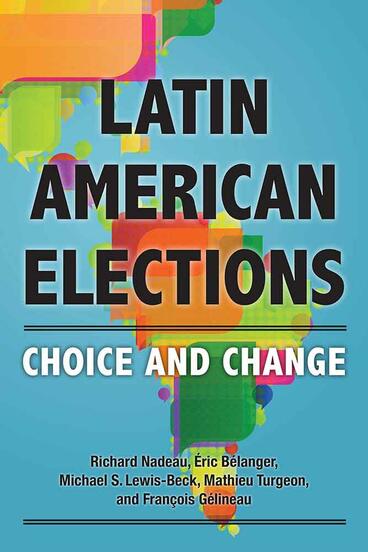Comprehensive study of the application of the Michigan model to explain voting behavior in Latin America
Description
The Michigan model, named after the institution where it was first articulated, has been used to explain voting behavior in North American and Western European democracies. In Latin American Elections, experts on Latin America join with experts on electoral studies to evaluate the model’s applicability in this region. Analyzing data from the AmericasBarometer, a scientific public opinion survey carried out in 18 Latin American nations from 2008 to 2012, the authors find that, like democratic voters elsewhere, Latin Americans respond to long-term forces, such as social class, political party ties, and political ideology while also paying attention to short-term issues, such as the economy, crime, corruption. Of course, Latin Americans differ from other Americans, and among themselves. Voters who have experienced left-wing populism may favor government curbs on freedom of expression, for example, while voters enduring high levels of economic deprivation or instability tend to vote against the party in power.The authors thus conclude that, to a surprising extent, the Michigan model offers a powerful explanatory model for voting behavior in Latin America.
Richard Nadeau is Professor of Political Science at the University of Montreal.
Éric Bélanger is Professor of Political Science at McGill University.
Michael S. Lewis-Beck is F. Wendell Miller Distinguished Professor of Political Science at the University of Iowa.
Mathieu Turgeon is Assistant Professor of Political Science at the Universidade de Brasília.
François Gélineau is Research Chair on Democracy and Parliamentary Institutions and Full Professor of Political Science at Université Laval.
Reviews
“Latin American Elections makes a strong case that voter choice in Latin America fits a universal mold while keeping cognizant of differences across countries in the region. The book is carefully motivated and engaging, and it makes an important contribution to scholarship on electoral behavior in general and in Latin America.”
—Elizabeth Zechmeister, Vanderbilt University
“This book makes an important contribution to our understanding of both voter decision making and Latin American political behavior. Latin American Elections offers a broader, more unified perspective on both the similarities and cross-national heterogeneity that characterize voter decision making in the region.”
—Ted Brader, University of Michigan

